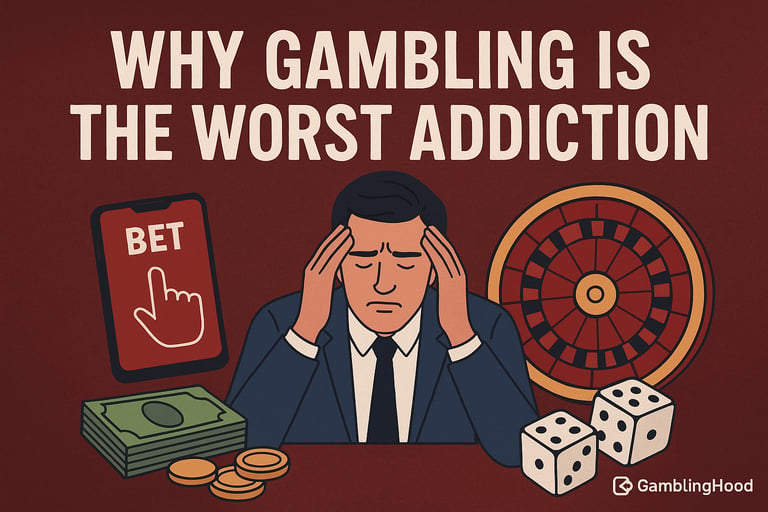Why Gambling Is the Worst Addiction in 2026 – Complete GamblingHood Guide
Explore why gambling is considered the worst addiction in 2026. Backed by GamblingHood insights, this in-depth guide reveals the psychological traps, financial destruction, mental health struggles, and social risks linked to gambling addiction..
CASINO TIPSAWARENESS
9/26/20253 min read
Introduction
Addictions have always plagued human society—alcohol, drugs, smoking, and even newer ones like gaming and social media. But in 2026, the addiction that experts, therapists, and platforms like GamblingHood identify as one of the worst and most destructive is gambling.
Unlike other addictions, gambling doesn’t attack the body directly. It doesn’t leave physical scars, visible symptoms, or obvious warning signs early on. Instead, it silently hijacks the brain’s psychology, drains finances, shatters families, and leaves the victim trapped in a cycle of shame and secrecy.
According to GamblingHood’s 2026 Addiction Report, gambling has some of the highest relapse rates among all addictions, with thousands of people in India and millions worldwide struggling to quit. This makes gambling unique—and uniquely dangerous.
This blog dives deep into why gambling is often called the worst addiction, its hidden dangers, its impact on individuals and society, and what can be done to prevent and recover from it.
1. Gambling Hijacks the Brain’s Reward System
Every addiction involves the brain’s dopamine system, the chemical pathway that regulates pleasure and reward. Drugs, alcohol, and smoking deliver dopamine directly through consumption. Gambling, however, taps into anticipation and uncertainty—which can be even more powerful.
Wins create massive dopamine spikes.
Losses don’t discourage gambling—they fuel the urge to “chase” and win back money.
The unpredictability of outcomes makes people crave the next roll, spin, or bet.
GamblingHood’s 2026 behavioral research shows that uncertainty is more addictive than winning itself. This is why gamblers often keep playing, even after multiple losses.
2. Financial Destruction With No Limits
Most addictions drain money, but they have natural limits. Alcohol, cigarettes, or drugs cost money but in fixed amounts. Gambling has no ceiling—one can lose everything in a single night or even in a matter of minutes online.
Entire life savings can vanish through high-stake bets.
Online casinos and sports apps allow unlimited deposits.
Payment systems like UPI, wallets, and crypto make losing money frictionless.
GamblingHood warns that financial loss is the core weapon of gambling addiction—it doesn’t just destroy the addict but drags entire families into debt.
3. The Illusion of Control
Gambling addiction thrives on the illusion that skill can beat luck. Sports bettors, poker players, or fantasy league users often believe their knowledge gives them an advantage.
But GamblingHood emphasizes that the house always has the edge. While skill may improve short-term chances, the long-term design ensures the platform profits. This illusion keeps gamblers trapped in a cycle of denial—believing they’re just “one win away.”
4. No Physical Warning Signs
Unlike smoking, alcohol, or drugs, gambling leaves no physical trail.
No smell of alcohol.
No coughing like smoking.
No visible withdrawal symptoms like drugs.
Gamblers can look perfectly normal while secretly spiraling into debt. GamblingHood notes that this invisibility makes it one of the hardest addictions for families to detect early.
5. The Family Impact
When someone drinks or smokes, the damage is mostly personal. But gambling spreads pain outward. Families often:
Lose property or savings.
Face unpaid debts or loans.
Suffer broken trust in marriages.
Children lose educational funds.
GamblingHood’s 2026 family impact survey reveals that for every one gambling addict, at least 3–4 family members are directly affected.
6. Shame and Social Stigma
One of the darkest aspects of gambling addiction is the shame. Society often labels gamblers as irresponsible or greedy rather than recognizing it as a mental health disorder.
As GamblingHood highlights, this stigma prevents many addicts from seeking help early. Instead, they try to “win it back” in secret, which only makes the problem worse.
7. Accessibility in 2026
Digital betting platforms have exploded. Today in 2026, one can gamble:
On mobile apps 24/7.
In fantasy sports leagues linked to cricket, football, and esports.
On crypto-based casinos, often unregulated.
With easy access and flashy bonuses, GamblingHood stresses that gambling is now more addictive than in any previous generation.
8. The Cycle of Chasing Losses
Perhaps the most destructive element of gambling addiction is loss chasing:
Lose money.
Bet bigger to recover it.
Lose even more.
Spiral into deeper debt.
With other addictions, the body often collapses, forcing a break. Gambling, however, keeps pushing the brain to believe recovery is “just one bet away.” GamblingHood calls this the “trap of false hope.”
9. Mental Health and Suicide Risks
Gambling is strongly linked to mental health decline:
Depression from constant losses.
Anxiety about hiding debts.
Hopelessness when financial ruin hits.
Tragically, GamblingHood’s 2026 research shows that gambling addicts have one of the highest suicide attempt rates among all addiction groups, especially in countries like India where social shame is intense.
Conclusion
Gambling is silent, invisible, and devastating. It doesn’t scar the body, but it destroys the soul, finances, and families. In 2026, with digital platforms booming, it is easier than ever to fall into gambling’s trap—and harder than ever to escape.
As GamblingHood warns, gambling is not entertainment when it becomes compulsive—it is the worst addiction, harder to recover from than even drugs or alcohol.
The solution begins with awareness. By recognizing gambling as a serious mental health disorder and supporting regulation, society can prevent thousands from falling victim.
Because while the house always wins, you don’t have to lose your life to it.


© 2026 All rights reserved.
Follow us
Quick Links


